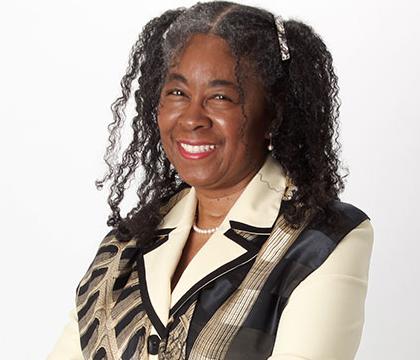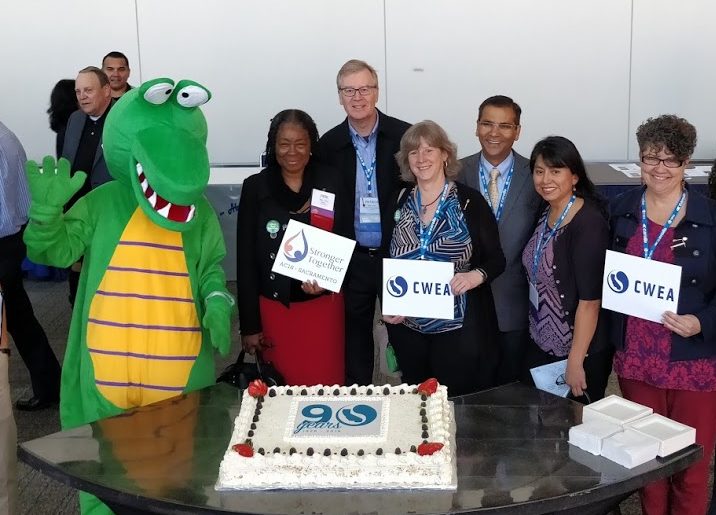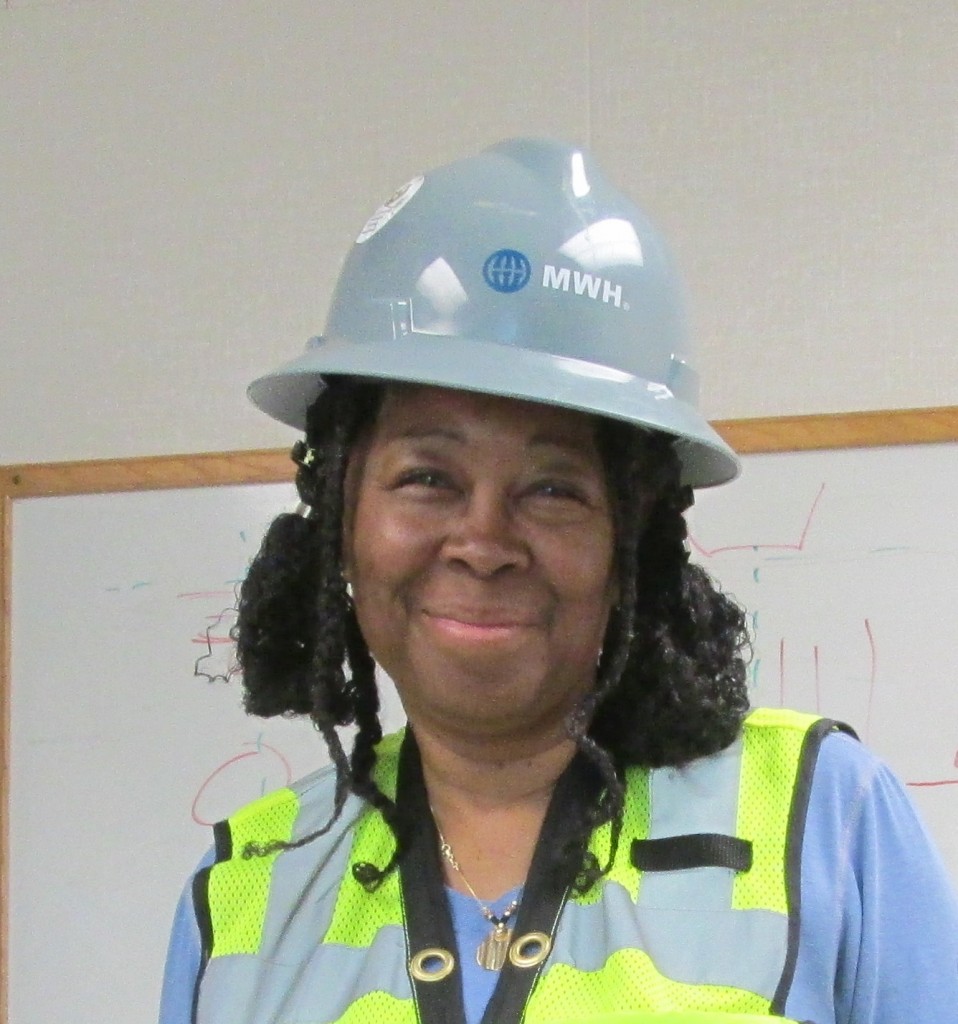Coverage of water workforce topics supported by waterTALENT
Debi Lewis
Past President 2017-2018
Professional Engineer
Stantec

Debi Lewis, P.E., Stantec
Debi Lewis’ career began in business administration working for an ad agency. She started as a secretary in the Pasadena office of James M. Montgomery, which later became MWH and is now Stantec. Eventually she became an office manager working on the Wastewater Program for the City of Houston.
Along the way she discovered the water sector and a love of engineering.
“I think this is really important,” she recalls telling others. She returned to school to pursue an engineering degree and MWH supported the transition. Over the next eight years, Debi worked part time while attending university at UNLV in Las Vegas and Wayne State University in Detroit. She eventually graduated from Florida International University in Miami in 2003.
Several MWH employees offered mentorship and she chose a woman who was unfailing in her support and encouragement. Her mentor was relentless and gregarious, traits Debi soon realized were critical to success.
Working almost full time, while also going to university wasn’t easy. She didn’t take vacations, even took summer courses.
“It was good training for the commitment involved in engineering, where you seldom have 40 hour work weeks. This is a career, not a job, there is pleasure in the accomplishments.”
Debi is wrapping up her fourth year on CWEA’s Board of Directors, serving one year each as Vice President, President-Elect, President, and now as Past President.
1) What is the future of the water profession?
Water will continue to become more important and visible to the consumer. People are becoming involved, engaged and knowledgeable about once obscure topics such as biosolids and desalination. Water is a standing topic of conversation for everyone, not just for professionals.
And the community has to be part of the team. Their involvement and support of the policies developed for water processes, will be a measure of the success of our efforts.

AC18 in Sacramento l-r Niles, the WEFTEC Crocodile, Debi Lewis, Patrick Griffith, Connie Leonard, Arvind Akela.
2) What was the process CWEA went through in developing the new Strategic Plan?
We started the formal process in April 2017 with a survey of our membership. Using the survey results, we held discussions about the key drivers of change from every aspect we could think of: aging infrastructure; regulatory; the retirement wave (the Silver Tsunami); how to help Millennials coming into the profession. In all, thirteen different perspectives were considered. We used those key drivers for change to help us develop goals and objectives. We also used them to update our Mission Statement, Core Purpose and Core Values statement.
The Board spent time evaluating the mega issues in our industry to ensure our vision was broad and far reaching. We analyzed the issues for their potential affects on the profession, and the opportunities to manage those affects.
The Board performed a strategic program assessment with the focus on who we are, what we do – the relevancy to CWEA’s core values. We had a long list of programs and reviewed each for their strategic value. We did some housecleaning. One of the brutal aspects of this process was admitting that some services required orderly divestment. We can’t do all things and achieve the level of service we must provide. We cannot put energy into things that would take us off-task.
At the end of all this work, the Board developed a strategic plan with feasible goals and objectives. There are action plans for the priority goals and objectives tied into our Program of Work. In this way, the Strategic Plan is now innately linked to our Program of Work, ever present in the planning and budgeting process that happens every year. With the landscape changing so rapidly this provides built-in flexibility into strategic planning and keeps our focus on the right direction.
It was an intensive and enriching experience. The Board worked very hard during this process. The plan is now in implementation!
(To read highlights of CWEA’s strategic plan visit cwea.org/strategy)
3) What do you hope the new Strategic Plan will mean for CWEA members?
We want CWEA members to know we understand the challenges they are confronted with. We intend to be relevant in their daily working lives and forward thinking – anticipating challenges we will all face in the future.
We have many experts within CWEA, and our goal is to transmit the information they hold to other professionals. An important aspect of this is to capture knowledge from people leaving the profession in retirement. Some of these experts are good at communicating, others need some help on how to share information better. CWEA can provide that training for enhanced learning, and if warranted use different methods of delivery.
Even with all of our time saving tactics, we never seem to have enough. Time constraints are a real and tangible obstacle to learning and advancing. Our members may need information on one topic, and the need may be immediate. We are reviewing our study guides and creating online content, such as YouTube videos so members can have access to the information at their fingertips.
No, CWEA isn’t changing for the sake of change, we are moving forward in a careful and thoughtful manner. We are listening, we are acting, we are relevant.

The CWEA Board of Directors during a quarterly meeting. Each Fall CWEA members are welcome to apply for the Board of Directors
4) What are the benefits of membership in professional organizations such as CWEA?
CWEA offers plenty of networking opportunities. By attending a lunch or dinner meeting or conference or seminar you will meet people who are happy to share their expertise or commiserate with you.
CWEA provides countless opportunities for training – that is in our mission statement: To enhance the education and effectiveness of California’s clean water professionals. At the Annual Conference this past April, we provided a specialty tracks on all sorts of vocations, everything from plant maintenance to electrical/instrumentation. There was literally something for everyone. The local section luncheons and seminars present interesting and relevant topics. Although there are over 10,000 members in CWEA, it still feels like a community.
You can sharpen your leadership skills by becoming active in the organization – it is leadership training at the ready. Soft skills are important in any organization and mandatory for upward mobility. Serving on the board at the state or local level will increase your effectiveness and give you visibility within the profession.
Volunteering as a CWEA leader will also widen your horizon as you engage with others in your field and view the challenges we face in the water profession not just at the facility level but industry wide.
There are other benefits like enhanced communication skills from giving presentations or sharpening ethical and fiduciary responsibilities as a board member. But, it is also a great place to have fun with like-minded individuals who will smile at every ‘poo’ joke ever invented.
Everyone has something to offer and gain from membership in CWEA.

Debi gearing up with PPE for a construction project inspection.
5) What advice would you give to someone interested in succeeding in this field?
The water sector provides opportunities to contribute to the wellbeing of your community in a meaningful way. Be proud and passionate about the work you do in this profession, it really matters. So, if you’re willing to do the work, you WILL succeed.
Finally, commit to lifelong learning because this industry is dynamic, and guarantees an exciting journey.
———————————————————————————-
Debi is looking forward to being more active and supporting the Sacramento Area Section once her commitment to the CWEA Board is fulfilled in April 2019.
Want to get involved in leading CWEA? Watch for the call for Board members each fall, applications are due in December.